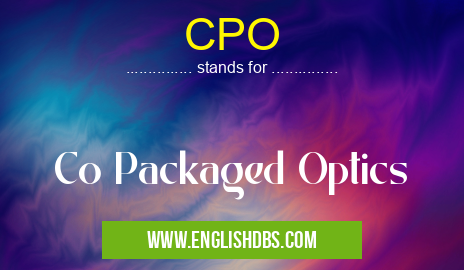What does CPO mean in OPTICS
CPO, an abbreviation in the field of technology, stands for Co-Packaged Optics. It represents a significant advancement in the design and integration of optical components into semiconductor packaging. CPO technology offers numerous advantages, including reduced size, improved performance, and lower power consumption.

CPO meaning in Optics in Academic & Science
CPO mostly used in an acronym Optics in Category Academic & Science that means Co Packaged Optics
Shorthand: CPO,
Full Form: Co Packaged Optics
For more information of "Co Packaged Optics", see the section below.
What is CPO (Co-Packaged Optics)?
CPO integrates optical components, such as lasers, modulators, and photodetectors, into the same package as the semiconductor chip. This close proximity enables high-speed data transmission between the chip and the optical components, eliminating the need for external optical modules and cables.
Advantages of CPO
- Reduced size and weight: By integrating optical components into the chip package, CPO significantly reduces the overall size and weight of the system. This is particularly beneficial for applications where space constraints are a concern.
- Improved performance: The close proximity between the optical components and the chip reduces signal loss and improves data transmission speed and reliability.
- Lower power consumption: The integration of optical components into the chip package eliminates the power consumption associated with external optical modules and cables.
Applications of CPO
CPO technology has a wide range of applications in various industries, including:
- Data centers: CPO enables high-speed interconnects between servers and network switches, increasing data throughput and reducing latency.
- Telecommunications: CPO improves the performance and reduces the size of optical transceivers, making them suitable for high-bandwidth applications such as 5G wireless networks.
- Consumer electronics: CPO can be used to integrate optical components into smartphones, laptops, and other devices, enabling faster data transfer and improved multimedia capabilities.
Essential Questions and Answers on Co Packaged Optics in "SCIENCE»OPTICS"
What is Co-Packaged Optics (CPO)?
Co-Packaged Optics integrates optical components directly into the packaging of an electronic chip. This reduces the distance between the electronics and optics, resulting in lower latency, higher bandwidth, and improved power efficiency.
What are the advantages of CPO?
Benefits of CPO include:
- Reduced latency and increased bandwidth
- Improved power efficiency
- Smaller form factor and reduced cost
- Enhanced reliability and signal integrity
Which industries benefit from CPO?
CPO is particularly beneficial for industries such as:
- Data centers
- High-performance computing
- Artificial intelligence
- 5G and beyond wireless networks
What are the challenges in implementing CPO?
Key challenges in CPO implementation include:
- Thermal management
- Optical alignment
- Packaging and assembly complexity
- Cost and scalability
How is CPO different from traditional optical modules?
Unlike traditional optical modules that are connected to the chip via a connector, CPO integrates the optics directly into the chip package. This provides significant advantages in terms of size, performance, and cost.
What is the future outlook for CPO?
CPO is expected to play a critical role in the development of next-generation high-speed networks and data centers. As demand for bandwidth and connectivity continues to grow, CPO will enable the delivery of higher data rates and improved efficiency.
Final Words: CPO technology offers significant advantages in terms of size, performance, and power consumption, making it a valuable solution for high-speed data transmission in various applications. The integration of optical components into semiconductor packaging represents a major advancement in the field of technology and is expected to play a crucial role in future electronic systems.
CPO also stands for: |
|
| All stands for CPO |
